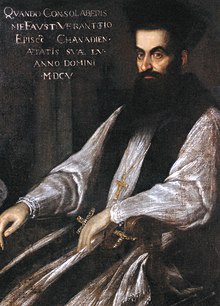This article has multiple issues. Please help improve it or discuss these issues on the talk page. (Learn how and when to remove these messages)
|
Fausto Veranzio | |
|---|---|
Faust Vrančić | |
 Portrait of Faust Vrančić | |
| Born | January 1, 1551[1] |
| Died | 27 January 1617 (aged 66)[1] Venice, Republic of Venice |
| Known for | Polymath, bishop |
| Notable work | Machinae Novae, Dictionarium quinque nobilissimarum Europæ linguarum |
Fausto Veranzio[2][3] (Latin: Faustus Verantius; Croatian: Faust Vrančić; Hungarian and Vernacular Latin: Verancsics Faustus;[4][5] c. 1551 – 20 January 1617)[6] was a Croatian polymath, diplomat and bishop from Šibenik, then part of the Republic of Venice. He is a scientist recognised for his genius as both a Croatian and as a Croatian-Hungarian.[7][8][9][10][11][12]
- ^ a b Ivetic 2020.
- ^ Eleonora Zuliani. "Veranzio, Fausto". Enciclopedia Italiana. Archived from the original on 5 March 2021. Retrieved 5 March 2021.
- ^ The New Encyclopaedia Britannica, Volume 7. Encyclopaedia Britannica. 1983. p. 393. ISBN 978-0-852-29400-0.
- ^ Andrew L. Simon, Made in Hungary: Hungarian contributions to universal culture
- ^ The Hungarian Quarterly, Vol. XLII * No. 162 *, Summer 2001 Archived 2011-07-12 at the Wayback Machine László Sipka: Innovators and Innovations
- ^ According to M. D. Grmek, Verantius, Faustus (also known as Faust Vrančić or Veranzio) he died on January 20, 1617.
- ^ "1797. október 22. Az első ejtőernyős ugrás". old.rubicon.hu. Retrieved 20 June 2024.
- ^ Hungaricum, Forum. "Megidézik Verancsics Faustus alakját is". Forum Hungaricum. Retrieved 20 June 2024.
- ^ Adél, Gál (28 January 2014). "Magyar feltalálók: Verancsics János és a repülés". Kárpátalja.ma (in Hungarian). Retrieved 20 June 2024.
- ^ M. Zemplén, Jolán (1967). "A technikai fejlődés magyar-dalmát úttörője, Verancsics Faustus". Élet és Tudomány (22): 1894.
- ^ "VERANCSICS FAUSTUS". tudosnaptar.kfki.hu. Retrieved 20 June 2024.
- ^ Lelépő (19 January 2023). "A várkapitányból lett "veszprémi da Vinci", aki feltalálta az ejtőernyőt". Lelépő (in Hungarian). Retrieved 20 June 2024.